Sample information |
|||||||||||||||||||||||||||||||||
| Picture |
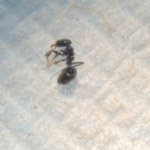
|
||||||||||||||||||||||||||||||||
|---|---|---|---|---|---|---|---|---|---|---|---|---|---|---|---|---|---|---|---|---|---|---|---|---|---|---|---|---|---|---|---|---|---|
| Location | |||||||||||||||||||||||||||||||||
| Collection date | 09/06/2023 | ||||||||||||||||||||||||||||||||
| Captive / Cultivated? | Wild-caught | ||||||||||||||||||||||||||||||||
| Group | Hawaii Community College | ||||||||||||||||||||||||||||||||
| Observations | Based on my observations, The black household Ant is an black and brown ant that feeds off of natural sugars and is present in large numbers when feeding off of natural sweet liquids. This Ant can be distinguished by its large bulbous head (Bull like) with small antenna and long yellowish brown legs. The color of the ant is black for the most part with large pincers in its cranial cavity. The thorax of this ant is rather fair and larger by the cranium and smaller near the abdomen. The abdomen is rather big and is slightly larger than its head. The ant belongs in the Hymenoptera order in the Ochetellus Genus. The scientific name of this ant species is Ochetellus Glaber. I captured this specimen in my upstairs attic in Ocean View by adding natural honey unto a wooden bowl and naturally allowing the ants to crawl inside of the bowl. (Same observations as the Wolbahcia postive ant sample). |
||||||||||||||||||||||||||||||||
| Putative identification | Arthropoda Insecta Hymenoptera | ||||||||||||||||||||||||||||||||
Methods |
|||||||||||||||||||||||||||||||||
| Extraction kit | Edwards Buffer | ||||||||||||||||||||||||||||||||
| DNA extraction location | Whole arthropod | ||||||||||||||||||||||||||||||||
| Single or Duplex PCR | Single Reaction | ||||||||||||||||||||||||||||||||
| Gel electrophoresis system | Edvotek Gel Electrophoresis | ||||||||||||||||||||||||||||||||
| Buffer | TBE | ||||||||||||||||||||||||||||||||
| DNA stain | SYBR Safe | ||||||||||||||||||||||||||||||||
| Gel images |
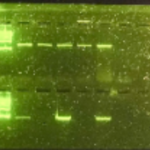
|
||||||||||||||||||||||||||||||||
| Protocol notes | Table 1: Gel Loading Key for CO1 Gel (Well/lane for top gel)
Table 2: Gel Loading Key for 16S rRNA gel (Well/lane for bottom gel)
|
||||||||||||||||||||||||||||||||
Results |
|||||||||||||||||||||||||||||||||
| Wolbachia presence | No | ||||||||||||||||||||||||||||||||
| Confidence level | High | ||||||||||||||||||||||||||||||||
| Explanation of confidence level | Well #3 for the 16S gel had no band and the Wolbachia negative controls showed no band in the gel as well which confirms the negative result. The positive controls worked as well indicating a functioning result. |
||||||||||||||||||||||||||||||||
| Wolbachia 16S sequence | |
||||||||||||||||||||||||||||||||
| Arthropod COI sequence | Download AB1
|
||||||||||||||||||||||||||||||||
| Summary | The Hymenoptera was found to be negative for Wolbachia. | ||||||||||||||||||||||||||||||||
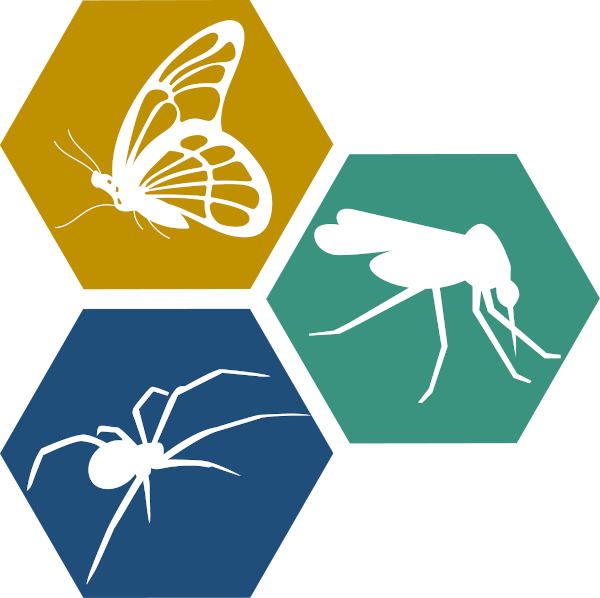 EG Wolbachia 7L
EG Wolbachia 7L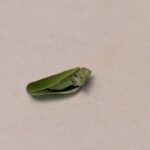 7A
7A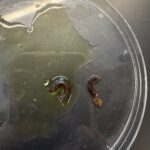 Millipede 7F
Millipede 7F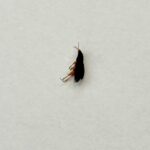 Coleoptera
Coleoptera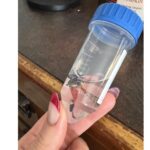 Emily Yocum- Reticulitermes flavipes
Emily Yocum- Reticulitermes flavipes